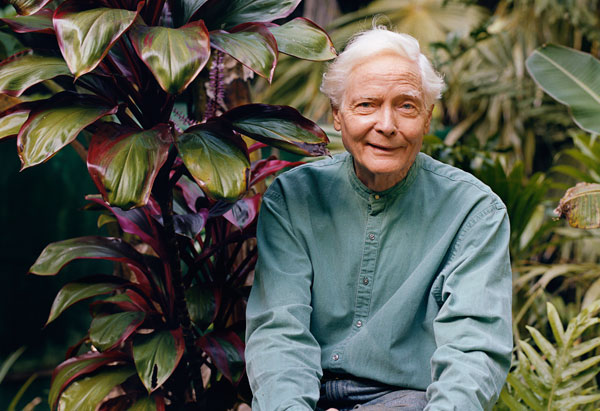Poet Laureate W.S. Merwin on His Connection to Nature

"VERY WISE CREATURES": Merwin, at home among the palms.
At his home on Maui's remote north shore, poet laureate W.S. Merwin is planting the seeds of a stronger connection to nature, one poem at a time.
The late-day Maui sun slants through a green cathedral of palms, vines, shrubs, flowers, ferns, grasses. Below, a vast sprawl of insects; a parallel universe of unseen creatures in the soil. Above, birds and butterflies and moths, flies and bees. W.S. Merwin, 17th poet laureate of the United States, walks among them, up the path to the house that he and his wife, Paula, built on the island's rugged north shore, near a town called Haiku. It's a place of wild rains and howling trade winds, sheer cliffs and pounding waves, a world apart from the lush southern beaches and tiki bars of tourist brochures. Hawaii is thousands of miles from New York City, where Merwin was born; Princeton, New Jersey, where he studied poetry and English; and the small town in Southern France where he lived in the '60s and where the local language was a medieval dialect known as Occitan. "This place is not convenient," Merwin says, gesturing at the jungly landscape. "It was never made to be convenient. And the places I've loved most in my life, none of them were particularly convenient."Merwin's voice is rich and warm, comforting in tone even when it's heavy with meaning. When he says "convenient," he draws the word out in a quizzical way that seems as though he's examining it, like a strange object in his hand. His presence has an interior light, a kind of glow that beams out through bright blue eyes and illuminates a shock of wavy white hair. He is more at home with the timeless than the time-pressed, and his work reflects that deeper zone. In his 83 years Merwin has written 26 books of poetry and eight books of prose, and he's translated 22 more, including Neruda's love poems, Dante's riffs on purgatory, and works originally written in French, Sanskrit, Japanese, Middle English, and the indigenous Andean language of Quechua. Along the way he's won pretty much any award you'd care to name: a pair of Pulitzers, the National Book Award for Poetry, the Lannan Literary Lifetime Achievement Award, the Bollingen Prize for Poetry—distinction upon distinction, prompting one critic to describe Merwin's contributions as "a body of wisdom literature that is unprecedented in our age." Even so, one suspects that Merwin's proudest feat is the reclamation of this formerly blasted-out patch of Maui rainforest.
I went to visit him there as the winter rains were beginning, driving east on the Hana Highway and then winding down into the Pe'ahi Valley, past green fields and red dirt roads, the Pacific Ocean in front of me, gleaming like a beacon. As I approached Merwin's land, the vegetation grew denser. Over the past 30 years he has planted more than 4,000 trees here, representing some 850 species, beginning on the day he closed on the property, nestling 18-inch saplings along the road. "I had long dreamed of having a chance, one day," Merwin recalled in a recent essay, "to try to restore a bit of the Earth's surface that had been abused by human 'improvement.'" These 19 acres gave him his chance: They had been scoured by sugar growers, razed for firewood, mowed by cattle, plowed for pineapple, starved of water, and eventually left to die. Local officials had written them off as "wasteland." At first, when Merwin began to tend it, the soil was too poor to support the noble hardwood koas or the majestic Hawaiian Pritchardia palms that had originally grown here, but he patiently planted Casuarinas, heartier nonnative species that dropped needles, enriched the soil, added their lives to the place. "Now they are being replaced in the habitat they improved," Merwin wrote, "by young palms."
Photo: Jill Greenberg



